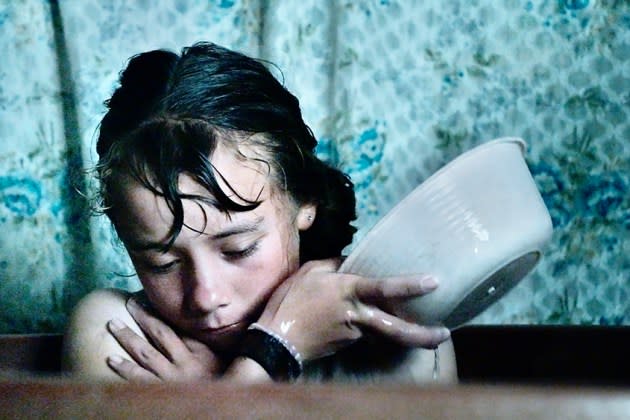‘The Echo’ Review: Tatiana Huezo Returns With Another Harshly Poetic View of Mexican Childhood

“The Echo” — or rather, El Eco — is the name of a tiny rural village in Mexico’s Puebla state that sufficiently captivated Mexican-Salvadorean filmmaker Tatiana Huezo into filming it over the course of 18 months, observing its changes in weather, fortune and the temperament of its few, tightly bonded residents in fine, fraught degrees. But there’s more to the title of Huezo’s return to documentary filmmaking — following the major success of her 2021 fiction debut “Prayers for the Stolen” — than a mere marker of place: Examining the unique ties that bind farming families, where everyone’s welfare hangs on the same unkind elements, this exquisitely textured film observes how children’s lives echo those of their parents, repeating for generations on the same constantly inconstant land, until somebody breaks the pattern.
There’s something of an echo, too, between Huezo’s last film and this one, even as they nominally occupy different forms: Just as “Prayers for the Stolen” followed the challenging adolescence of a young woman in a remote hillside community in the shadow of cartel violence, “The Echo” takes as its principal protagonist a teenage girl, Montse, prematurely aged by the rigors and responsibilities of a life on the land, and considering a path divergent from that of her parents and ancestors. She may be a real-life human subject rather than a constructed character, but in its fully inhabited storytelling and environmental detailing, “The Echo” feels notably consistent with its fictional predecessor — as Huezo eschews interviews, voiceover or other editorializing for a slow-burning ode to face and place that plays as accessibly as “Prayers,” and should find a home in an equivalent range of arthouse theatrical and streaming spaces.
More from Variety
'The Teachers' Lounge' Review: Lessons Are Taught and Taut in a Gripping Classroom-Ethics Thriller
French Documentary 'On the Adamant' Wins Golden Bear at Berlin
After switching to DP Dariela Ludlow for her foray into fiction, Huezo reunites with longterm collaborator and personal partner Ernesto Pardo on “The Echo,” and the patient, watchful presence of his camera is integral to the raw lyricism of a project that alternates between on-the-fly spontaneity of movement and studied painterliness of lighting and compositions. The former mostly comes outdoors, as he and Huezo track the exhaustive daily routines of a community built on sheep-and-corn husbandry, at one point running and diving into the thick of a jostling herd. Inside small, dimly lit houses, meanwhile, we observe equally demanding domestic drudgery and intimate conservation at leisure: It’s here where familial roles and hierarchies are most clearly asserted and accepted. (Men are a sturdy background presence; women, as presented here, take the forefront.)
“She is your responsibility from now on,” says Montse’s mom Luz Ma to her, as she gives her own elderly mother a bath, instructing the teen to bathe her frail abuela “like she’s a baby.” This is the circle of life in El Eco, and nobody much treasures it, or questions it either: It’s just how things are in a system designed around survival of self, for the care of others. The children of the village are immersed early in this culture of responsibility, required to tend to livestock and their elders alike. In the course of “The Echo” we witness two burials — one of an aged human, another of a parched sheep — and both are carried out with equivalent dutiful solemnity. All life is sacred in El Eco; on the flip side, in this stringently pragmatic society, all life is ultimately disposable.
Even school, ostensibly the kids’ one escape from the strains of farm life, operates on a similar give-and-take basis: Older children are taught to teach their juniors, at least up to a middle-school graduation point. Some get to educate themselves further, farther away from the village; others make do with what they’ve learned. For Montse, however, the life handed down from her parents and their staggered parents before them seems insufficient: She dreams of pursuing whatever Mexico City, a few hours’ drive away, has to offer, and leaves. With this precedent set, her younger sister is inspired to follow her, or find her; a new echo begins. Luz Ma doesn’t stand in Montse’s way, but doesn’t know how to help with this branched-off life either: “I feel like maybe I wasn’t the best mom for her,” she sighs, in one of the film’s few instances of first-person commentary. “She’ll go far if she doesn’t come undone.”
Huezo observes this splintering community with unsentimental tenderness, with only Leonardo Heiblum and Jacobo Lieberman’s ornate, traditionally-inflected score occasionally sweetening proceedings. The film’s flourishes of joy and grandeur are simple, elemental ones, mostly granted by landscape and weather: At the close, a hot white slice of lightning breaks the screen, signaling relief after a lengthy drought, but hardly an idealized long-term solution to the greater generational problems facing El Eco.
Best of Variety
Sign up for Variety’s Newsletter. For the latest news, follow us on Facebook, Twitter, and Instagram.

 Yahoo News
Yahoo News 